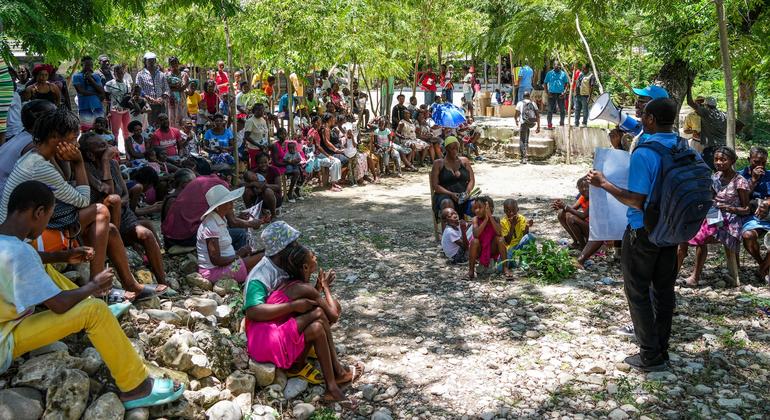Sure! Here’s the translation into American English:
—
Christiana experienced a tragic turn in her life when her husband was murdered last year amid the growing wave of gang violence in Haiti. Devastated by this loss, she and her six children were forced to leave their home, traveling 223 kilometers to Mirebalais, where her six-year-old daughter, Leineda, began treatment for malnutrition. However, in March, the family had to flee again from the gangs, this time to Boucan-Carré, interrupting Leineda’s treatments.
The situation in Haiti is alarming. Over the past few months, armed gangs have expanded their control beyond Port-au-Prince, displacing approximately 64,000 people, according to the International Organization for Migration. Humanitarian operations have been severely affected by insecurity and lack of funding. Wanja Kaaria, director of the UN World Food Program, emphasized that images of women and children fleeing are heart-wrenching, reflecting an increasingly critical reality.
The context of violence worsened after the assassination of President Jovenel Moïse in 2021, which triggered massive gang control over the capital. Today, about 85% of Port-au-Prince is under their dominion, causing more than a million Haitians to flee their homes. Recently, a gang attacked Mirebalais, resulting in a tragic toll of at least 15 civilians dead and 515 inmates escaped. Violence has impacted other areas, intensifying the suffering of communities.
“Children are trapped in a cycle of fear and suffering,” warned Geeta Narayan, UNICEF representative in Haiti, while emphasizing the urgency of ending the violence. Despite the obstacles, UNICEF is implementing initiatives to provide healthcare, psychosocial support, access to clean water, and education for affected children.
Logistical difficulties in delivering humanitarian aid have forced local authorities to reduce distributions. Danise, a mother of two and displaced multiple times, laments not having enough resources to feed her family and eagerly awaits the arrival of aid.
UN teams continue to strive to provide basic resources to displaced communities. UNICEF has assisted 8,500 people in the Center department, and the WFP has provided food assistance to over 13,100 displaced individuals. However, financial constraints hamper the expansion of these supports.
The WFP estimates that it will require $72.4 million in the coming year, while UNICEF needs $1.2 million in the next six months to continue supporting those affected by the crisis. The Office for the Coordination of Humanitarian Affairs seeks to strengthen aid despite the scarce resources available.
Recently, in Boucan-Carré, Leineda has begun receiving the treatment she needs, and her mother expresses renewed hope. “The presence of doctors restores our dignity. It helps us,” says Christiana, reflecting the longing of many families to regain normalcy.
—
If you need further assistance or modifications, feel free to ask!
Referrer: MiMub in Spanish










